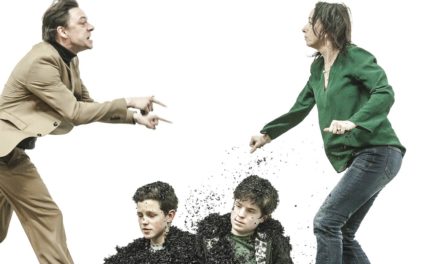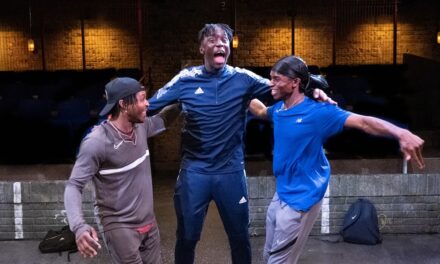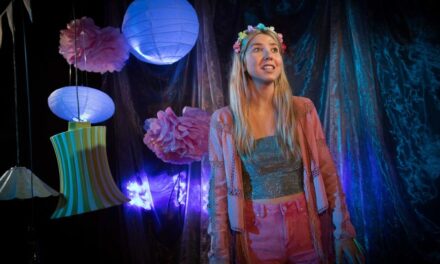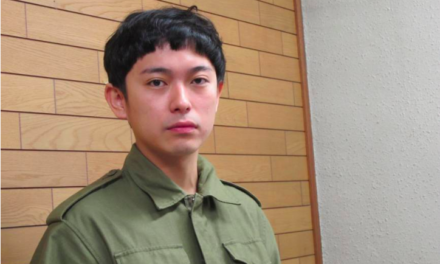Anty-gone Triptych Part II is a melange of movement, song, poetry, and emotion. Giving the viewer very few explicit narrative cues, the production creates a vulnerable and engaging relationship with the audience, enticing them to bring their own imagination to the experience. Delving into the what’s and why’s of the production, the conversation with Director Grzegorz Bral offers insight into the spiritual creation of Anty-gone.
Emma Cooper: Why did you choose to do Anty-gone?
Grzegorz Bral: Why not?
EC: How did the Greeks influence the aesthetic decisions you made for the production?
GB: That’s an interesting question. Actually from the very beginning, you know the name of the company “Song of the Goat,” comes from the root of the Greek word for tragedy. So, in the Greek language trago means tragedy, and it’s Song of the Goat; so it’s the first thing. From the very beginning, I’m interested in exploring maybe not so much ancient Greek theatre as the idea of how the theatre came about. Why somebody created theatre; why it became such a powerful tool, medium for the society to meet together and to meet alive, witnessing each other; and why people love to hear stories; and what kind of effect it makes on society; why it is important; why it is there are so many varieties of theatre. We use one name theatre, but actually there’s not one theatre. There are millions of different sorts of theatres. For some reason, we can name all of them, we can name theatres. For me, this is the main question, because it’s like the most profound phenomenon of the world is the theatre. People on one side, as Jerzy Grotowski would say or watching or participating, there are different kinds of theatre. In Africa, there is a forum, which is an educational theatre. People do theatre in order to tell simple farmers how to use condoms, how to protect from HIV, this is another type of theatre, this is another reason. From the beginning, I was more interested in the idea of theatre than just the idea of the Greek theatre. I’m interested in Greek theatre in the sense that in our European tradition, this is maybe the first known theatre. There are eastern traditions in Japan and China, in India, which are much older theatre forms. But in the East, almost every art is related to the sacredness and to the temples and to the monasteries. Art is an offspring, is a continuation of the spiritual life of people. And I was wondering, what kind of continuation, what kind of spiritual life must have preceded theatre in order for theatre to happen in Europe. For instance, we know about Greek mythology. We know about Greek gods. Some of the gods lived very long in Greece, but I’m not saying in terms of culture. I’m saying in terms of their real presence amongst people. Many historical characters such as Helen of Troy, such as Theseus, they were children of gods, they were semi-gods as they say. And also, historically, apparently, whether it’s a myth or not only a myth, gods tend to appear between people for near two-and-a-half thousand years before the Christ. The two Greek goddesses Demeter and Persephone, they would appear once a year alive for people to witness what they call Mysteries of Elefsina, it’s a Greek, small village where for two-and-a-half thousand years, the two Greek goddesses appeared so people could see them and witness them. Theatre must have some spiritual origins in Greece. It’s like to try to re-evoke the presence of gods once again on stage. So actors are replacing gods and heroes and titans, who are not present anymore amongst people because there is too much evil in people’s minds. So the gods decided not to appear anymore. But then theatre takes over the throne. So I am very interested in that aspect of theatre. It’s a replacement of sacredness. Theatre is a replacement of sacredness. It’s a replacement for sacredness that decided not to come anymore, but people wanted it to still exist, still wanted this connection.
EC: What other influences inspired you throughout this production process?
GB: There is never one inspiration, for sure. I’m making Anty-gone, I’m not really interested in Antigone. Antigone, of course, coming back to your first question, Antigone represents certain problems. I think every director decides to make another production because of the certain feeling of the situation here and now. The universality of the ancient Greek tragedies is so huge that every generation, every moment in culture is good to make Shakespeare, Greek tragedies—it’s just good because they are so universal. Of course, this incredible conflict between Antigone and Kreon, meaning who to follow: whether to follow the rules of the sacredness and the gods or whether to follow the rules of society. It is not so obvious anymore. In many different situations, in many different countries, for instance, in Poland, we have a big problem with the church, because the church is too big, too powerful, but at the same time is so corrupted with pedophilia and financial corruption and lack of spirituality. This is a big problem, so even though people want to follow some kind of sacredness, they’d rather choose a government than the church. I also chose Antigone, and there are several inspirations. Very often, when I approach a play, when I approach a tragedy, I remember that it is one person who wrote this. Every character in the play comes from one mind. It’s not different minds put together, it’s one person. For me, the theatre very often, and what we present on stage, is the mind of the creator. The one who wrote the play, a tragedy, becomes like a sort of artistic god, and we imagine what happened in his amazing creative mind, and how he made all the characters to become alive, to appear in front of us. This is one aspect that I’m always interested in a protagonist that is a writer or composer. So very often people would misunderstand my productions thinking this is a play, but very often I only speak about the creator. For instance, I had a play called The Island, based on Shakespeare’s Tempest. And everything is about Prospero without Prospero, because everything onstage is Prospero’s mind. This is one of the aspects, socio-political aspect, it’s diversity, it’s not just diversity, it’s the importance of questions. What is more important for our life. But also, one of the theatremakers who I always found incredibly inspiring for me was Samuel Beckett. What I love about Samuel Beckett is simplicity, which is so profound that you think, “My God, he is writing almost nothing,” and so much comes. His writing is so impossible to interpret, whatever you say about him is at the same time truth and nonsense. Truth and nonsense. For me, this is like an incredibly profound and important piece of art: if you create something that everybody reveres as a masterpiece and nobody can really interpret it properly. This is beautiful.
EC: For an inexperienced dance-viewer, what would you tell them about the show to tell them what they are about to see?
GB: You can distinguish mainly, one way of making theatre which you could say is horizontal, that means linear, that means the story happens from A to B to C, Zed and so on and so on. In that way people will follow the unfolding story, unwrapping story. In the case of my theatre, you have to rely totally on your own imagination. I will not give you support such as, “The story goes like this.” Unless you know Antigone, then your imagination will be supported by you knowing the content of the play. But, generally, I am doing a theatre which you should call vertical. I am interested in your experience. So I am creating events onstage to trigger your imagination, not to tell you literally. You know I love American movies, but most American movies are propaganda, and they are very shallow. Very rarely you find a profound story, a deep story that engages you; generally, it is propaganda. I don’t like that kind of theatre: propaganda. So what I like, I like the audience because I can work and play and trigger the audience’s imagination. So that for me is like a different way of creating theatre.
EC: How do you feel that this representation of Antigone, the Antigone story, speaks to this present moment?
GB: I’m not sure if I can answer this question. It’s how I feel, very often when you are creating something, you don’t really answer for yourself these questions: why am I doing this? You’re doing this because you’re doing this. I know it’s a little weird answer. Sometimes I know things, and sometimes I feel that this is simply what I want to do. Sometimes you feel like you have the appetite for pizza, so you go for pizza. You’re not answering for yourself, “Why am I eating pizza? This is unhealthy.” But you just have a need. This Antigone that you have, it’s only the middle part. The whole Anty-gone that we created is three parts. The first part is from the perspective of Kreon, then the second part is from the perspective of Antigone, and the third part is a battle between Antigone and Kreon, where Antigone is represented by dance and Kreon is represented by the music, by the voices. Only to see the middle part doesn’t really give you a full picture of my game. What I wanted to show in the second part was more like young girls’ very poetic nature. So I wanted to use no words, but just movement and sounds, because I wanted it to be very poetic without any ideology. I remember very vividly, my first experience when I was what, sixteen, so many years ago. I saw Grotowski’s last performance alive, and I remember the sensation of it. I remember how it changed my life, although I didn’t understand it really. It wasn’t a story, it was just an impression. In the late 19th century and early 20th century, in fine arts we have impressionism. And they were absolutely negated at the beginning, nobody wanted them, strange and weird, nobody understood. And now their paintings are worth millions. Because they are classics, captured something that a more realistic painting couldn’t capture. They captured something internal, so they didn’t create photography paintings, they created an impression of emotion. So the second part of Antigone is impressionism, an impression of emotions.
EC: Do you feel that your reflection on the production has changed since coronavirus?
GB: That’s an interesting question. A few days ago, I read a wonderful interview with Marina Abramovic, and she was asked exactly this question: how COVID’s influence affected her art. And she said what I’m going to tell you, in my opinion too. If you consider yourself a true artist, neither before neither later this virus will change how I’m going to think about art and how I’m going to work. It just doesn’t make sense to me. It is what it is, it was before, it will come in the future. You as an artist should remain with the message you want to convey to your audience—that’s it. No coronavirus should affect you. I’m not a journalist; journalists are constantly affected by good or bad news, mostly by the bad news. This is their work: to be affected by the news. But a true artist, the real artist, should never be affected by things like this. This just comes and goes, that’s it.
This post was written by the author in their personal capacity.The opinions expressed in this article are the author’s own and do not reflect the view of The Theatre Times, their staff or collaborators.
This post was written by Emma Cooper.
The views expressed here belong to the author and do not necessarily reflect our views and opinions.


















